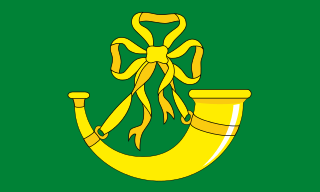Related Research Articles

Huntingdonshire is a non-metropolitan district of Cambridgeshire, as well as a historic county of England. Its council is based in Huntingdon. Other towns in the district are St Ives, Godmanchester, St Neots and Ramsey. The population was 169,508 at the 2011 Census. Henry II, on his accession in 1154, declared all of Huntingdonshire a royal forest, but its favourable arable soil, with loam, light clay and gravel, hence good drainage, meant it was largely farmland by the 18th century.
Sir Godfrey Copley, 2nd Baronet FRS of Sprotbrough House, near Doncaster, South Yorkshire, was an English landowner, art-collector and Tory politician who sat in the English and British House of Commons between 1679 and 1709.

Earl of Huntingdon is a title which has been created several times in the Peerage of England. The medieval title was associated with the ruling house of Scotland.

Marquess of Tweeddale is a title of the Peerage of Scotland, created in 1694 for the 2nd Earl of Tweeddale. Lord Tweeddale holds the subsidiary titles of Earl of Tweeddale, Earl of Gifford (1694), Viscount of Walden (1694), Lord Hay of Yester (1488), and Baron Tweeddale, of Yester in the County of Haddington (1881), all but the last in the Peerage of Scotland. As Baron Tweeddale in the Peerage of the United Kingdom, Lord Tweeddale sat between 1881 and 1963 in the House of Lords. The Marquess' eldest son uses Viscount Walden as a courtesy title.

Baron Hungerford is a title in the Peerage of England. It was created on 7 January 1426 for Walter Hungerford, who was summoned to parliament, had been Member of Parliament, Speaker of the House and invested as Knight of the Order of the Garter before and was made Lord High Treasurer one year before he became a peer. The man who would later succeed as third baron was created Baron de Moleyns on 13 January 1445 by writ of summons; both titles merged when he succeeded as Baron Hungerford in 1459. The third baron was attainted and the peerage forfeit in 1461. This attainder was reversed in 1485 for the then 4th baroness of Hungerford, and so it came into the Hastings family of Earls of Huntingdon until 1789, when it came into the Rawdon(-Hastings) family of the Marquesses of Hastings until 1868 when it fell into abeyance. This abeyance was terminated three years later for a member of the Abney-Hastings family and an Earl of Loudoun. In 1920 it again fell into abeyance, which was terminated one year later for the Philipps family of the Viscounts of St Davids where it has remained since.
James Stuart may refer to:

Narada Michael Walden is an American singer, songwriter, musician, and record producer. He acquired the nickname Narada from Sri Chinmoy. He is currently the drummer for Journey, having joined on May 23, 2020.

The Cambridge News is a British daily newspaper. Published each weekday and on Saturdays, it is distributed from its Waterbeach base. In the period December 2010 – June 2011 it had an average daily circulation of 20,987, but by December 2016 this had fallen to around 13,000. In 2018, the circulation of the newspaper fell to 8,005 and by June 2020 the preceding 6 month average was 5,375 readers per issue.
John Kennedy, 7th Earl of Cassilis, PC was a Scottish peer, the son of John Kennedy, 6th Earl of Cassilis.
The High Sheriff of Hertfordshire was an ancient Sheriff title originating in the time of the Angles, not long after the invasion of the Kingdom of England, which was in existence for around a thousand years. On 1 April 1974, under the provisions of the Local Government Act 1972, the title of Sheriff of Hertfordshire was retitled High Sheriff of Hertfordshire. The High Shrievalties are the oldest secular titles under the Crown in England and Wales, their purpose being to represent the monarch at a local level, historically in the shires.
Lionel Walden (1861-1933) was an American painter active in Hawaii, Cornwall, and France.

Theophilus Hastings, 7th Earl of Huntingdon was a 17th-century English politician and Jacobite. Once the leading political power in Leicestershire, his family had declined in influence; regaining that position became his primary ambition and drove his political choices. During the 1679 to 1681 Exclusion Crisis, he supported the removal from the succession of the Catholic heir, James, Duke of York, before switching allegiance in 1681.
Pierre Raffeix (1633–1724) was a French Jesuit missionary in Canada.

Robert Cecil, of St. Anne's, Westminster and King's Walden, Hertfordshire, was an English Whig politician who sat in the English and British House of Commons between 1701 and 1710,

George Hastings, 8th Earl of Huntingdon (1677–1705) was the son of Theophilus Hastings, 7th Earl of Huntingdon and his first wife Elizabeth Lewis; he succeeded his father in 1701.
Lionel Walden (1861-1933), American painter.
Sir Lionel Walden of Huntingdon was an English Member of Parliament in 1661-1679 and 1685-1687 and Mayor of Huntingdon for 1686–87.
Jane Granville, Countess of Bath, formerly Jane Wyche, was the wife of John Granville, 1st Earl of Bath, and the mother of the 2nd Earl. She was a Lady of the Bedchamber to Catherine of Braganza, the queen consort of King Charles II of England.
Sidney Wortley Montagu, of Wortley, Yorkshire and Walcot, Northamptonshire, was a British coal-owner and Whig politician who sat in the English and British House of Commons between 1679 and 1727. He was one of the leading coal owners in the North-East and a member of powerful coal cartels. Although he served in Parliament over a long period, his contributions there were limited.
References
This article needs additional or more specific categories .(December 2019) |
| This article about a 17th-century Member of the Parliament of England (up to 1707) is a stub. You can help Wikipedia by expanding it. |